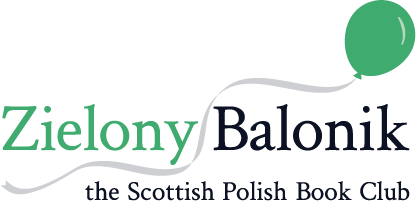Ukraine: a personal exploration before Putin’s invasion (2023)

Ukraine, the edge of Europe, now takes centre stage. This book explores this little known land whose fertile soil has made it the “breadbasket” of Europe and beyond.
Jenny Robertson, an experienced author, brings a multi-faceted understanding of the complexities and richness of this land, where the story of the Eastern Slavs begins. She writes of her travels in Ukraine, meeting local people, discussing landscape and history, how the country has related to Poland and Russia in the past.
While located before Putin’s invasion, this book about the real Ukraine will give essential background as well as a delightful visit to a lovely country.
Buy online:
https://buy.sanctusmedia.com/store/products/ukraine-a-personal-exploration-before-putins-invasion
Zielony Balonik book club notes:
Jenny spent time in Ukraine between 2005 and 2018. She first went when her husband Stuart, an Anglican priest, was asked to do a locum for the congregation in Kiev (which meets in the Lutheran church). She was reluctant to go, and agreed only on condition that they travel around the country. Besides, in the event she disliked Kiev, and was interested in the region’s Polish and Jewish history and heritage; that of the Poles was taken from them by the deals made at Yalta, Tehran and Potsdam towards the end of World War Two.
The timeline in the book is deliberately vague, in part because there were few major changes during these years, the Maidan protests notwithstanding, when Stuart’s church in Kiev was used as a hospital.
When in Ukraine she kept ad hoc diary notes and took some photos, with no particular aim in mind at the time.
Jenny had written a children’s book set in the Kresy (Polish Borderlands).
In the 19th centuries the Poles lived in the castles and the Ukranians or Ruthenians (as the Ukranians were then known) worked the fields. The Habsburg parliaments were skewed to ensure the Polish magnates held and retained power. In 1918 Austria gave Ukraine independence, which only lasted a matter of weeks before Poland – itself newly independent – invaded. The book doesn’t hide from describing the cruelty on both sides.
Ukraine was only named such in 1923, when it became a Soviet Socialist Republic. Putin plays on this fact to claim that there is no such entity as Ukraine, certainly not one with a recognised history as a nation state. This is true, though there was a national consciousness before the 20th century.
As part of Operation Vistula at the end of World War Two Poles from this area were resettled in the so-called Recovered Lands, ie formerly German territories, while Ukranian communities in Poland were disbanded amd scattered, in part for their part in helping insurgents including those who assassinated a Communist Polish general.
Since 2004 (when Poland joined the EU) Polish / Ukranian relations have improved, and old grievances overcome or marginalised.
When the Russian army invaded recently they expected to be welcomed, and were shocked when it was not forthcoming.
How and when will the war end? Will Ukraine end up like Israel, weaponised by the West against a dangerous neighbour? There is now widepsread antagonism towards Russia, Russian culture and the notion of ‘Russki mir’. Will there be partition? The current Russian strategy is one of intimidation, e.g. bombing Kharkiv, part of their declared province and inhabited by their so-called Russian brothers.
The languages Jenny and Stuart know (and those they don’t, or know less well, including Ukranian) are part of the story.
Dressing up for battle re-enactments offers some freedom from the drudgery of everyday life.
People from Belarus visit so they can speak freely to one another.
The natural world there is beautiful, in part because of poverty and neglect.
Ukranians living in Edinburgh wondered why they would want to visit Volyn, seen as a backwater.
Travelling by bus and train wasn’t always comfortable or convenient – but a good way to see the country as locals experience it.
They visited ‘lost Polish cities’ of Ukraine, such as Kamieniec Podolski, now Kamianets-Podilskyi (which features in Olga Tokarczuk’s novel The Books of Jacob, set in the eighteenth century), and Krzemieniec (now Krements), where the Polish church there stayed open (though it wasn’t used for services until 1955, and then in great secrecy) as the Communist authorities were persuaded that the memorial to the ‘revolutionary’ Juliusz Słowacki was worth retaining. Słowacki was one of the three great Romantic bards along with Mickiewicz and Norwid, so hardly a revolutionary poet in the sense that the commissar understood.
Ukraine has much productive, fertile land, and areas of ecological importance. There is potential for tourism, though some already exists, with visitors including Germans, Poles, (Israeli) Jews and Turks; alongside worries about migration.
Robert commented that reading the book is of course coloured by the ongoing war. A comparison of contemporary Poland and contemporary Ukraine shows how much the former has changed since EU accession. What do these changes, plus the ongoing war, mean for Ukraine? In the future there may be even more of a clash between the city and the countryside. Post-war, can the EU afford having Ukraine join? In Poland there are better roads and railways, but everything has become more commercial, with orchards replaced by plantations. Slow trains had their drawbacks, but also their pleasures.
Jenny is grateful to Jock Stein at Handsel Press who agreed to publish it in a run of 500 copies. It’s personal book, perhaps her last one, and it was important to her to see it published.
Other books on Ukraine mentioned by Jenny include
A Small Town in Ukraine by Bernard Wasserstein (Allen Lane, 2023)
reviewed in The Guardian
Execution by Hunger: The Hidden Holocaust by Miron Dolot (Norton, 1985)


